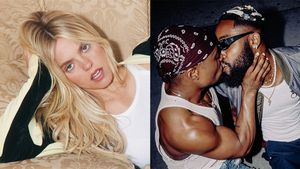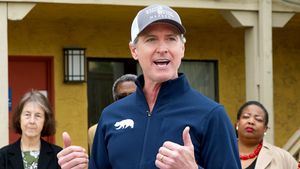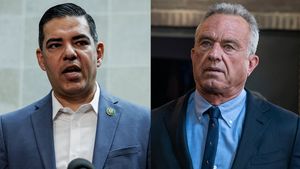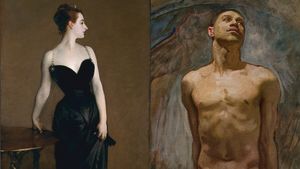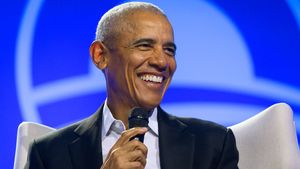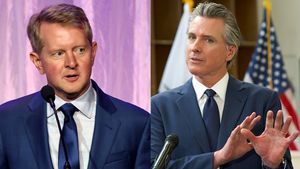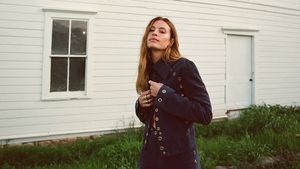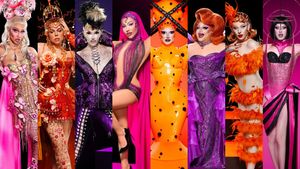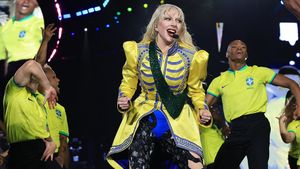Treatment GuideJust DiagnosedSex & DatingAfrican AmericanStigmaAsk the HIV DocPrEP En EspañolNewsVoicesPrint IssueVideoOut 100
CONTACTCAREER OPPORTUNITIESADVERTISE WITH USPRIVACY POLICYPRIVACY PREFERENCESTERMS OF USELEGAL NOTICE
© 2025 Pride Publishing Inc.
All Rights reserved
All Rights reserved
Scroll To Top
By continuing to use our site, you agree to our Privacy Policy and Terms of Use.
In many ways, Devin Robinson is a typical college student: He's passionate about theater (in which he received a bachelors' degree in December from Florida Atlantic University), theology (which he plans to study in graduate school), and black history. But if you look a bit deeper, what you find is anything but ordinary. For starters, the 25-year-old is better known by the monikers 'Devin T. Robinson X' and 'Egypt.' And he's making a name for himself as one of his generation's most intense AIDS activists, using poetry and performance art to teach audiences about HIV and safer-sex practices. Robinson has also overcome enormous hurdles in his life. Orphaned at 12 when his mother died and his father abandoned him, Robinson was raised by his then'18-year-old sister, Chasity. Like many disenfranchised youths, he says he turned to selling drugs, petty theft, and fighting, resulting in his being arrested more than once. But a deep-seated drive to overcome his circumstances'and to repay his sister's selflessness'led him to clean up his act and enroll in college. And as his nieces and nephews neared adolescence, Robinson became painfully aware that HIV-prevention messages were failing them'as well as most African-Americans. So despite being HIV-negative himself, the Fort Lauderdale, Fla., native has made fighting the disease his personal mission. In 2003 he launched AIDS Awareness Poets, a group of young people who educate their peers about HIV through poetry and spoken-word performances. For the past three years he's also staged one-man, HIV-themed 'confessional narratives' around the nation, including performances at the legendary Apollo Theater in Harlem, on MTV, and at numerous other venues through Black Entertainment Television's 'Rap-It-Up' campaign. Robinson's accomplishments, impressive for someone of any age, are particularly noteworthy given that most of his peers are more interested in partying, dating, and making money than in changing the world. But Robinson tells HIV Plus he has no plans of slowing down'and that he's now more committed to stopping the spread of HIV than ever before. On your website you write, 'The two things that I care most about are HIV and black history'two of the things that are lost in the media and minds of youth.' How do these two things relate to each other? I see HIV as another obstacle for the black community. When you look through our history, there have been so many obstacles'slavery, oppression, racism, even at one point being seen as having only a fraction of the human worth as a white man. HIV is just another obstacle we face'and will defeat. What is it that leads you to say these issues are lost in the minds of today's youths? No one cares about HIV anymore. You don't see it on TV. You don't read about it in magazines or newspapers. People don't talk about it. In order to get them thinking and talking about it again, you have to put it in front of them every day. It needs to be on TV. It needs to be in our music. It needs to be something we see as important to our culture. How do we make HIV important again? We need to make the people who talk about HIV and fight HIV into celebrities'because, let's face it, people pay attention to celebrities. Think about someone like Paris Hilton. I mean, I don't really have any interest in her, but I know so much about her and what's happening with her life because it's talked about in the media every day. Every day! That's what needs to happen with people who are bringing attention to AIDS. We need to give celebrity status to AIDS advocates so that they really grab the attention of everyone around them. How did you become an AIDS activist? What are your roots in activism? When I was 10 years old, while my mom was still alive, she asked me, 'Who do you look up to?' And I answered, 'Martin Luther King Jr.' She asked me why him, and I said that he believes the value of a person is the content of the character and not the color of the skin. I didn't even know what I was saying! I didn't know what exactly that meant until I got to college. But I do think that conversation was a sign from God to do something bigger with my life. I was always interested in helping people. That's just who I am, even as a kid. Rather than saying 'I played basketball today,' I wanted to be able to say 'I helped someone today.' So you were volunteering at charitable organizations when you were just a teenager? Yeah, but that's just me. That's me 24-7. And when I got to college it just'bam!'took off. I started working with the Florida African-American Student Association, and from there I was everywhere'at Planned Parenthood, at gay and lesbian organizations, at youth organizations, at agencies working on domestic violence or drug abuse. The more I learned, the more things I found to fight for. Do you think your passion is unusual for someone so young? If you look back at groups like the Black Panthers and other nonviolent organizations that led the way for change in this country, they were led by young people. By students. It was common back then for young people to stand up and shout, 'No! We can't accept this anymore!' I want to take us back to yesteryear and inspire young people to do the same thing today. I want to show them that it's OK to stand up and say, 'Let's do something!' Much of your role in working to 'do something' is using your skills as a poet, writer, and performer to help educate people about HIV. Why do you think that approach'using the arts to educate'is effective for you? No one wants to be lectured. People would rather hear something dynamic. That's the beauty of using entertainment to teach people about HIV'about anything, really. People might be laughing at your performance or crying at what you're doing, but you're also able to sneak a little information in there. So I realized early on that this was a perfect technique to educate a whole new audience about AIDS. And from using your own poetry to educate people with AIDS, you founded an advocacy organization. How did that come about? I founded AIDS Awareness Poets in 2003 as a club on my campus [at Palm Beach Community College] to make sure that people like me had an outlet, a venue for their poetry and their activism. And it grew from there to a national organization with chapters all across the country. The basic idea is that all of the poets in the group use performing arts and revolutionary tactics to educate people about social issues, including HIV. And I say 'revolutionary tactics' because we hit people in places where they normally wouldn't hear anything about HIV. That's important, because it's precisely where people aren't talking about HIV that the virus is flourishing. How did your work evolve from poetry to writing and appearing in one-man stage shows about the virus? I had written three different HIV-themed monologues, what I call 'confessional narratives.' At my community college's annual talent pageant I performed one of the monologues for the first time. People were crying and standing and applauding at the end. That's when I realized that not only was I good at this but that I was really connecting with people. From there, I just added more confessional narratives together to make longer shows. One of these shows has a pretty provocative title: God Did Not Give Me HIV. What are the focus and the goals of that show? It's based on the idea that unless you're born with HIV or contracted it through a blood transfusion or something like that, then you were infected because of your own behavior. It is not anyone else's fault that [he or she is] HIV-positive, and it certainly is not God's fault. I bring religion into it only so that I can kick it right back out again. I wanted to say, 'You can't blame God for your actions. It was all you. So let's leave God out of this equation and move on from there. If you stop blaming everyone else for what's happening, you can make that shift from victim to victor.' What have the audience reactions been like? It's crazy! [Laughs] There was a member of an audience who saw it the other day who couldn't even talk to me. She just came up to me with tears in her eyes and couldn't even speak. I get reactions like that all across the board, from every demographic group. People are touched by it and can relate to what I say. They just connect with the characters on the stage in their own way'whether they're old, young, white, black, Jewish, Christian, whatever. But not all of your performance work is HIV-focused. One of your shows, Stolen Virginity, focuses on the history of black people in this country. What were your goals in writing and performing that show? The premise of Stolen Virginity is that the innocence of the black community'our history, our artifacts, our culture'was stolen from us through the slave trade. Even our religions, our names, and our families were taken from us. Through my one-man show and my confessional narratives, we can get some of that back. It's a whole different dynamic than my shows about HIV. And people just go nuts over it! They lose their minds! How so? Well, for one thing, it helps black people reconnect with part of who they are. But on a larger scale it allows everyone to get excited about their own history and their own culture, regardless of what demographic group they might be in. They can see me onstage and think, If black culture is that beautiful, then maybe my culture is too. That's powerful. That connection with your own history is a powerful thing, and too many people today have forgotten that. In fact, the name you use'Devin T. Robinson X'was chosen partly to recognize your history, correct? For many black people, the only reason that they have a particular last name is because it was given to [their ancestors] as slaves. The name given to me by my mother is Devin T. Robinson. I added the X to represent my unknown African heritage as well as to honor my ancestors from preslavery days who were not known by the name Robinson. And relatively recently you've started calling yourself Egypt. What's the significance of that moniker? I find it very interesting that people now talk about Egypt as if it's part of the Middle East. It's not! It's part of Africa, and it always has been! And Egypt influenced all of the rest of human civilization. That's what I want to do. I want to influence the people around me the same way Egypt influenced the entire world. Speaking of influence, there have been a lot of renowned and award-winning performance pieces over the years that focus on HIV'Rent, Angels in America, The Normal Heart. Were you influenced by any of these? I haven't seen any of those plays. I don't really like plays, to be honest. I usually clench my teeth all the way through them! No, I've been influenced by people like Richard Pryor and Eddie Murphy in the way they can capture an audience and have people on pins and needles. One minute they're joking with you and the next they hit you with something powerful. And you're there saying, 'Hit me with another one!' They showed me that if I could do that, audience members would listen to everything I have to say. That's what I want to achieve. So you're grabbing the attention of audience members and helping educate them about HIV. But what do you personally get back from your performances? Love. That's what I get back: love. This is how I fill myself, how I fill my soul. It's all about the love and respect for me. Love and respect follow you to your grave. Money doesn't. I'd rather leave a legacy of love. That's what I'm about. How do you see your continuing role in helping to spread that message that black people'that everyone'can be victorious in the fight against AIDS? I'm going to keep influencing people, young and old, to stand up and create their own niche in this fight. I'm going to keep talking about it. I'm going to keep writing about it. I'm going to keep performing about it. You're going to see me everywhere'in the media, on TV, in the movies. I'm going to be that person who years from now you can look back and say, 'He really sparked the attention of America'of the whole world.' I want to go down in history as someone who stood up and inspired others. That's what I hope my legacy will be.
Recommended Stories for You
From our Sponsors
Most Popular
Lexi Love comes out as HIV+ after Trump deletes federal resources
January 23 2025 11:23 AM
Grindr is reminding us why jockstraps are so sexy and iconic
May 02 2025 5:36 PM
BREAKING NEWS: Trump admin moves to end federal HIV prevention programs
March 18 2025 6:10 PM
Trump's orders prompt CDC to erase HIV resources
January 31 2025 5:29 PM
Celebrating Black History Month with our annual African American issue
February 01 2025 3:28 PM
Tyler TerMeer vows to continue to fight for health care for all
January 28 2025 3:00 PM
Discover the power of Wellness in your life
March 26 2025 12:41 PM
Plus: Featured Video
More Videos
0 seconds of 3 minutes, 18 secondsVolume 0%
Press shift question mark to access a list of keyboard shortcuts
Keyboard Shortcuts
Shortcuts Open/Close/ or ?
Play/PauseSPACE
Increase Volume↑
Decrease Volume↓
Seek Forward→
Seek Backward←
Captions On/Offc
Fullscreen/Exit Fullscreenf
Mute/Unmutem
Decrease Caption Size-
Increase Caption Size+ or =
Seek %0-9
Copied
Live
00:00
03:18
03:18
Latest Stories
Dancer. Healer. Survivor. DéShaun Armbrister is all of the above
July 02 2025 8:23 PM
Two right-wing Supreme Court justices signal they may uphold access to PrEP and more
April 21 2025 4:10 PM
Broadway's best raise over $1 million for LGBTQ+ and HIV causes
April 03 2025 7:15 PM
Plus nominated for 2025 GLAAD Media Award
January 22 2025 12:42 PM
'RuPaul's Drag Race' star Trinity K Bonet quietly comes out trans
December 15 2024 6:27 PM
AIDS Memorial Quilt displayed at White House for the first time
December 02 2024 1:21 PM
BREAKING: Supreme Court rules to save free access to preventive care, including PrEP
June 27 2025 10:32 AM
1985: the year the AIDS crisis finally broke through the silence
June 26 2025 11:24 AM
Trump admin guts $258 million in funding for HIV vaccine research
June 03 2025 3:47 PM
500,000 Children at Risk: PEPFAR Funding Crisis
April 08 2025 3:51 PM
The Talk Season 5 premieres this spring with HIV guidance for the newly diagnosed
March 26 2025 1:00 PM
Jess King is here to help you live your happiest, healthiest life yet
March 24 2025 4:35 PM
A camp for HIV-positive kids is for sale. Here's why its founder is celebrating
January 02 2025 12:21 PM
VIDEO: A man living with HIV discusses his journey to fatherhood
June 10 2025 4:58 PM
HRC holds 'die-in' to protest Trump health care cuts
April 28 2025 2:11 PM
Season 4 of The Switch on resilience & radical self-love returns this spring
March 26 2025 12:20 PM
Gerald Garth is keeping people of color happy and healthy through trying times
March 11 2025 3:38 PM
This long-term HIV survivor says testosterone therapy helped save his life.
December 16 2024 8:00 PM
Ricky Martin delivers showstopping performance for 2024 World AIDS Day
December 05 2024 12:08 PM



